#Joan d vinge
Explore tagged Tumblr posts
Text

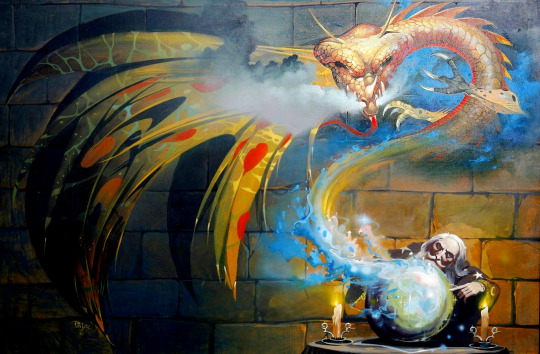

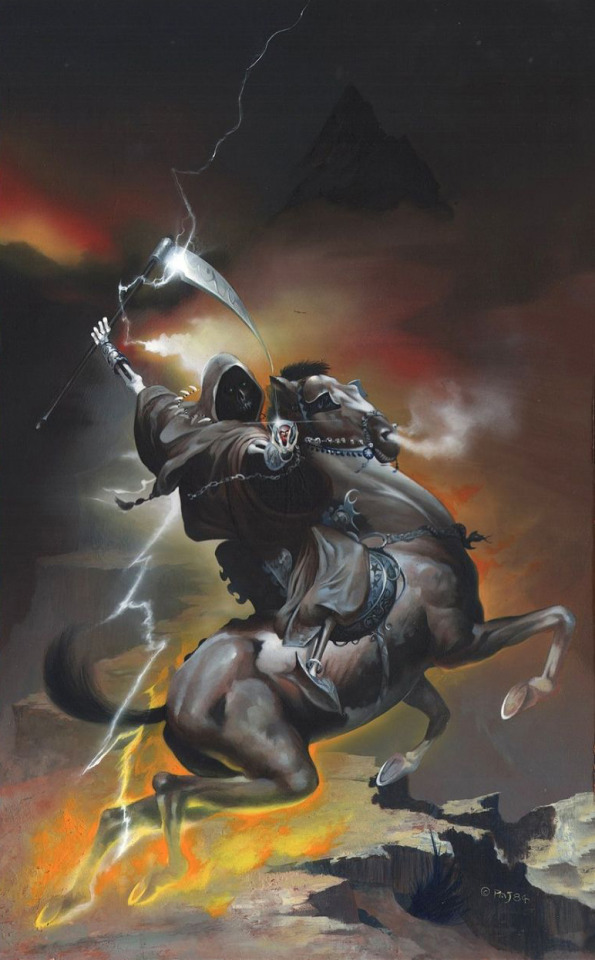
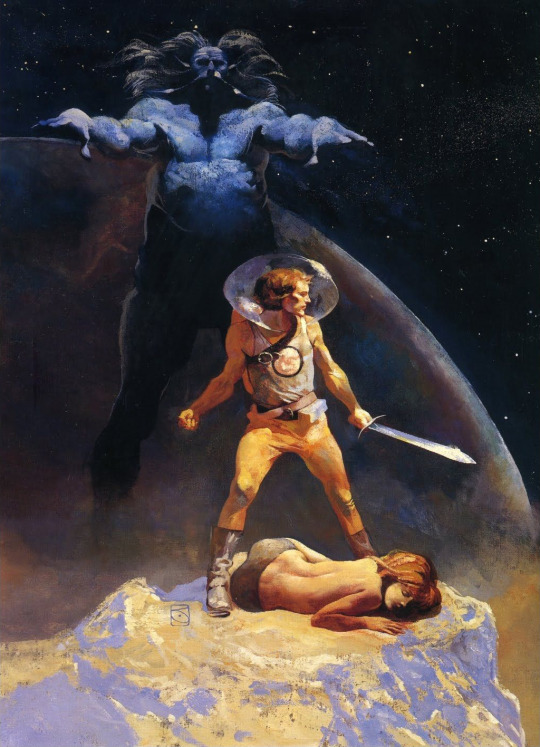
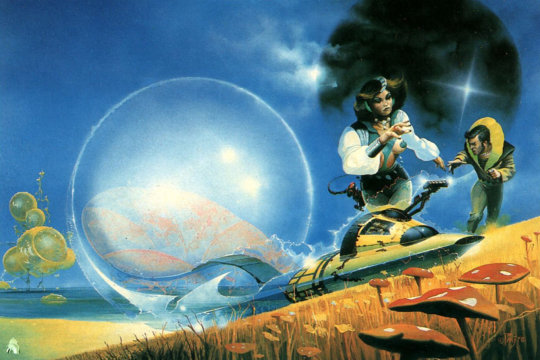
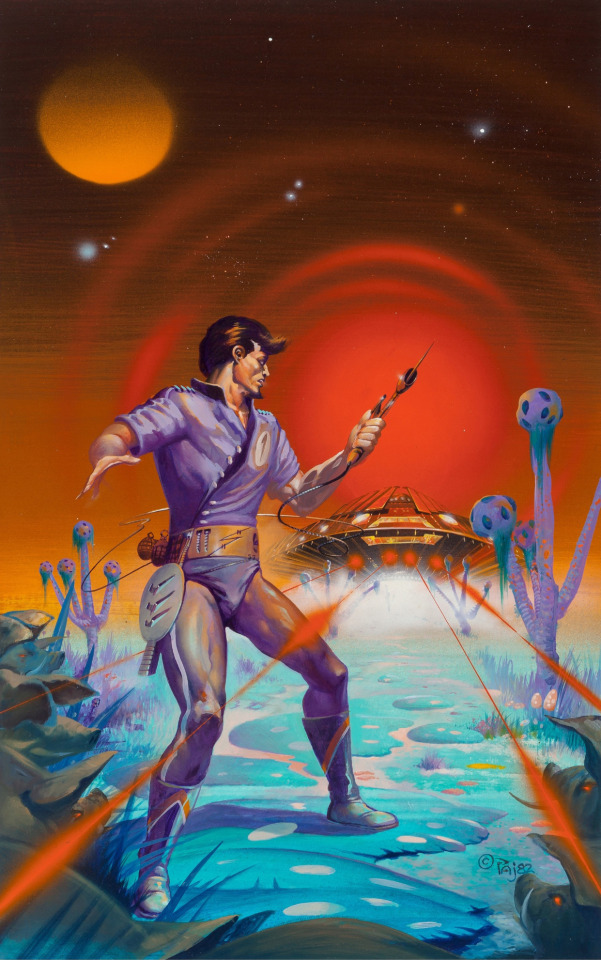
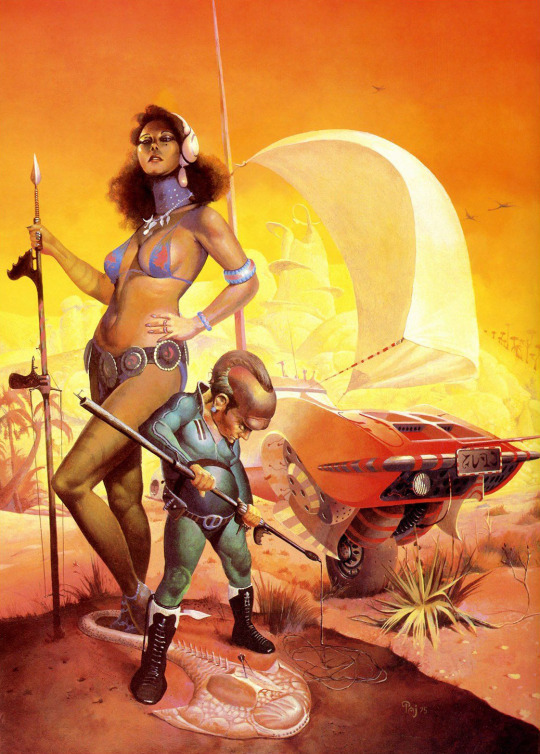

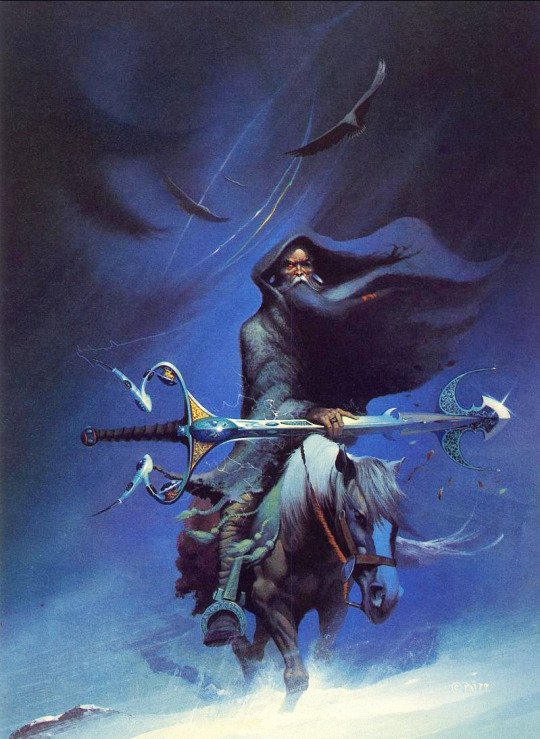
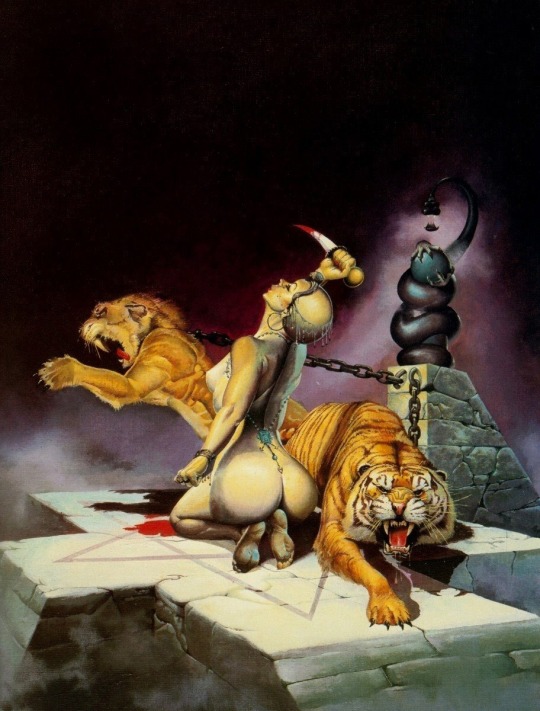
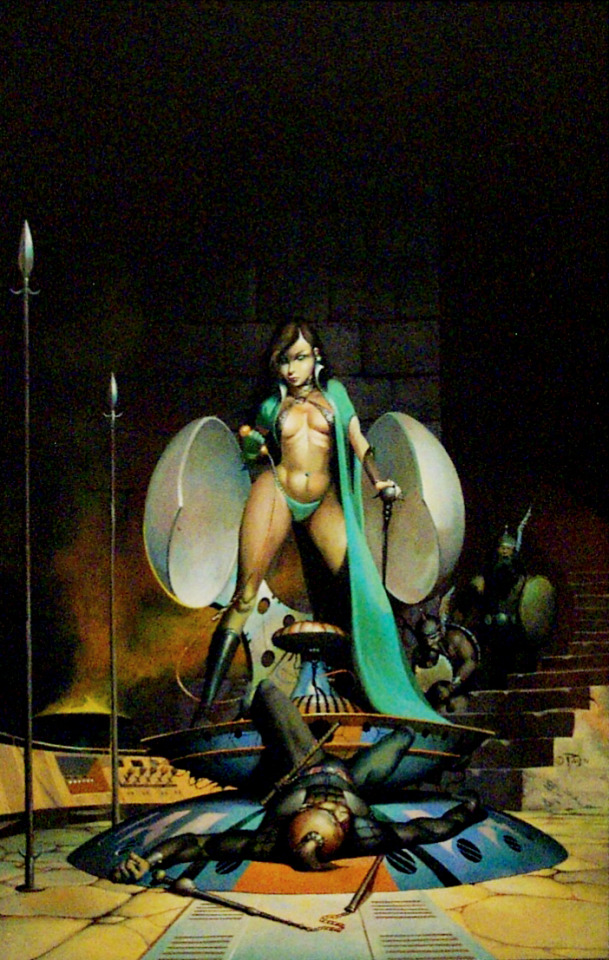
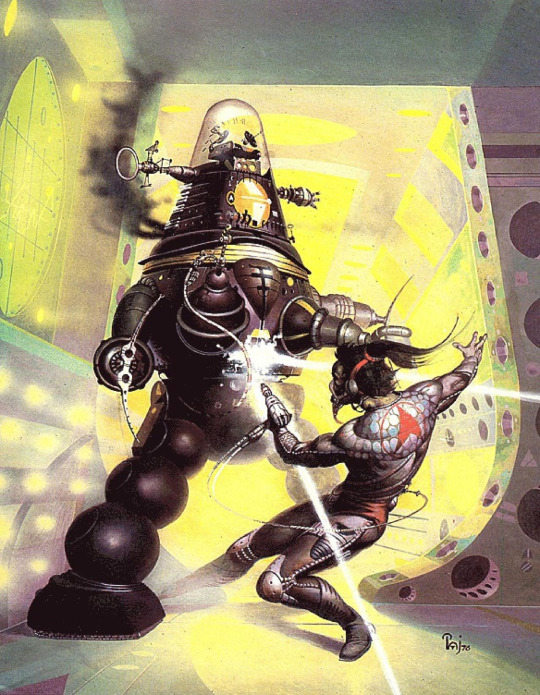

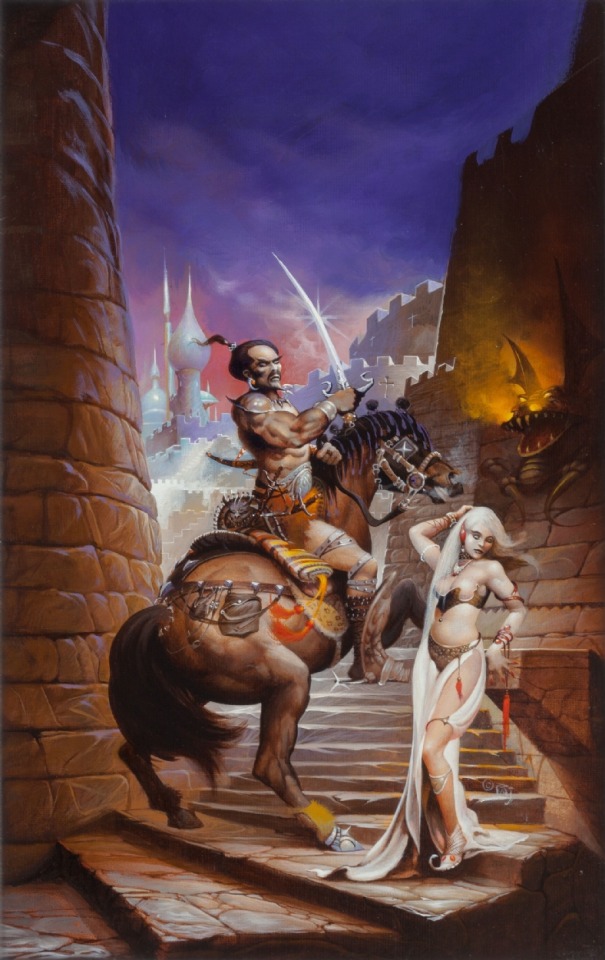
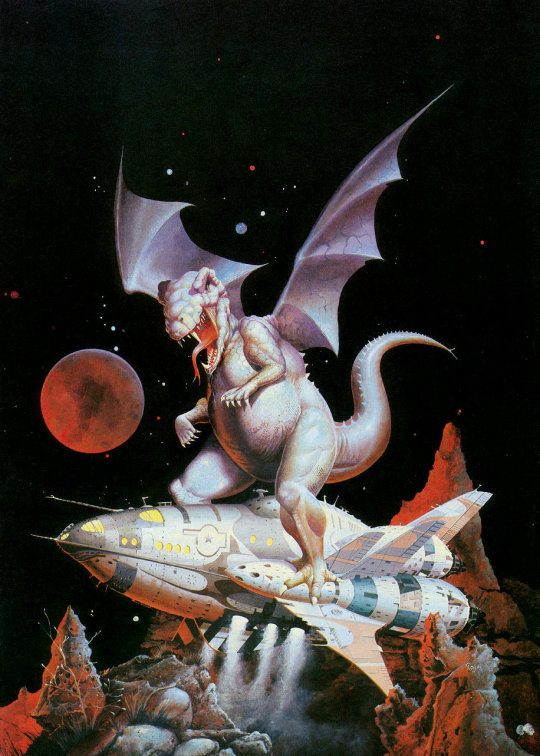


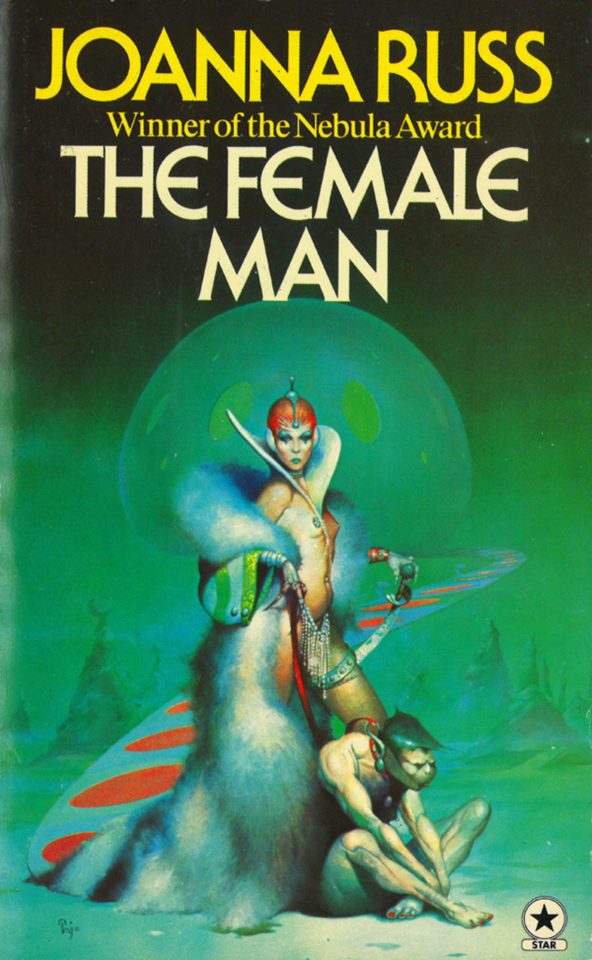



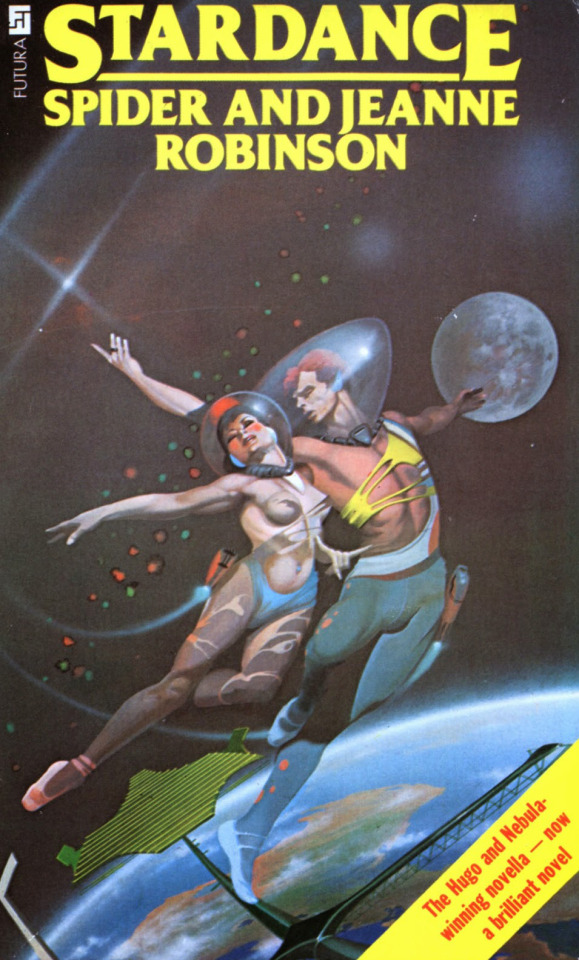

Showcasing art from some of my favourite artists, and those that have attracted my attention, in the field of visual arts, including vintage; pulp; pop culture; books and comics; concert posters; fantastical and imaginative realism; classical; contemporary; new contemporary; pop surrealism; conceptual and illustration.
The art of Peter Andrew Jones.
#Art#Peter Andrew Jones#Fantasy Art#Fantastical Art#Imaginative Realism#Sci-Fi#Science Fiction#Sci-Fi Art#Books#Book Cover#Book Cover Art#Cover Art#Fighting Fantasy#Frank Herbert#Robert A Heinlein#Larry Niven#Joan D Vinge#The Sword And The Sorcerer
56 notes
·
View notes
Text

Just One More Page Challenge Day 8: Other-Worldly
I read Joan D. Vinge’s The Snow Queen last year as part of my honors thesis and immediately fell in love with its characters and intricate world-building.
I love how Vinge combines elements of classical fantasy with science fiction aesthetics and concepts—it makes for a truly “other-worldly” reading experience!
24 notes
·
View notes
Text







Thrift store finds...
#Joan d vinge#ae van vogt#richard k morgan#neal stephenson#Theodore sturgeon#slan#altered carbon#world's end#the world of null-a#anathem#the cosmic rape#books#science fiction#literature#science fiction literature#thrift store
1 note
·
View note
Text
so i just reread psion by joan d vinge for the first time as an adult and good lord how was this book ever put in the teen section of my local library?? i love it to bits though and you should definitely read it.
some of the most beautiful character development known to humanity
basically the whole series is an allegory for the treatment of indigenous people, lgbtqia+, and the violence inherent to capitalism
one of the most interesting takes on the repercussions of telepathy… incredibly fleshed out world building
the female characters throughout the series are very well written 🎉🎉
MOTIVES THAT MAKE SENSE… you will see yourself in these characters, sometimes that will be good, sometimes that will make you stare into the void
big focus on platonic love throughout the series (and yes, some romance too)
the prose goes hard, and we’re talking ‘in the country of the blind, the one eyed man is stoned to death’ hard
When is comes down to it, psion is a story about love: for yourself, for your friends, and for life itself.
Rereading this series is like coming back to an old friend, so you know it’s a 5/5 from me. It reads like spiced hot chocolate, it’s sweet and bitter and leaves you staring and the bottom of your cup just processing everything you’ve read.
1 note
·
View note
Text

Michael Whelan, 'The Snow Queen', ''Spectrum'', 1994 Book cover for Joan D. Vinge's 1980 science fiction book.
#michael whelan#american artists#Joan D. Vinge#the snow queen#scifi art#science fiction art#color illustration
280 notes
·
View notes
Text

"The Summer Queen" by author Joan D. Vinge. Book 3 in The Snow Queen Cycle. Jacket art by Michael Whelan.
6 notes
·
View notes
Text
Would be that my favourite adaptation of Hans Christian Anderson's The Snow Queen is the space opera which is basically Dune if it was on a ocean planet instead of a desert, 'Gerda' is the 'Snow Queen's' clone, she and 'Kay' are on a quest to become sibyls (basically Sense8 several decades early), 'Kay' becomes the 'Snow Queen's' consort and is known as 'Starbuck'
(it was the 80s and the massive coffee chain was yet to come, but still, yeeeah...)
'Gerda' has to battle her way across the galaxy to get back to 'Kay'...except that she doesn't really do anything except transported from place to place, 'Kay' slaughters a whole bunch of sentient sea-dwelling creatures for their MacGuffin blood, and 'Gerda's' secondary love interest is the book's equivalent of the reindeer who helps her escape from the Robber Girl.
Bet you didn't expect that last bit.
#Joan D. Vinge#the snow queen#the snow queen 1980#It's a book where I like the world and the secondary characters much more than the main characters#I'd love to see what it would be like adapted to live action and with slightly more OOMPH for 'Gerda' and 'Kay'
8 notes
·
View notes
Text
Indifference is the strongest force in the universe. It makes everything it touches meaningless. Love and hate don’t stand a chance against it.
The Snow Queen by Joan D. Vinge
0 notes
Text

📘 June 28, 2023
I finally finished a book 😭 I've been reading this since March and finished it last week, it was definitely a struggle to get through
I'd give it 2.5/5 stars. the world building was interesting enough, but the pacing was off and by the end, I didn't really like any of the characters, save maybe two. I looked up reviews for this as I was reading it and most of them said it was a skip, and I think I'd have to agree 😅 I probably won't be rereading it, and I was pretty disappointed in the ending
onto my next book though!!
more review/spoilers under the cut
the biggest issue was that none of the characters were really likeable??
Sparks had justifiable anger at the end, and yes he made a mistake getting robbed at the beginning, but he didn't have to sidle up next to the queen as quickly as he did, especially considering how often he talked about how "hollow" she was and that it bothered him that she wasn't Moon even though they looked identical.
Moon definitely had a lot of drive, but why was she still so motivated to get back to Sparks after seeing him as Starbuck? she could've eventually gotten over him and focused entirely on the Sibyl stuff.
I also hate that they still ended up together. Sparks is never going to fully trust Moon again or forgive her, so the future of that relationship is going to be so rocky. I also can't look past the fact that they were raised as first cousins and believe that they are. even if they actually aren't related, they still believe they are at the end of the book and it kinda taints the whole book because that's the main reason either of them have any motivation.
Arienrhod was a decent villain/evil Queen, but her character didn't feel super groundbreaking. she has all the traits of a corrupt monarch: selfish, conceited, power hungry, technology and spies at her fingertips, but what else? granted this was written in 1980, so it could've been novel for a female antagonist character at the time, but the extra depth of character still felt lacking- I don't feel like a full reason for why she wanted to hold onto her power was given.
BZ was one of the characters I liked. despite the shame he knew he would get from his home planets society for what happened to him, he kept going. he wasn't going to let that perception stop him.
and the other character I liked was Jerusha. she had good intentions with wanting to change the policing from the inside, but she should've known she couldn't do it alone. even though it worked out, it wasn't fun to watch her suffer so much for so little payoff at the end. and it felt like she was the only character to make a decision for herself at the end as well, everyone else just seemed to go along with "fate" or what someone else wanted/told them to do, no one else showed that kind of autonomy.
the world building was definitely the most interesting part, I liked the establishment of the Hegemony and the cycle between the Summers and Winters on Tiamat. I also thought the reveal of the truth about Sibyls was cool and well set up, I felt like that was when the plot hit it's peak.
I thought the ending was too long and dragged on a bit though, just like this review is now ✌️ thanks for reading if you got this far
1 note
·
View note
Text
April 2023 TBR
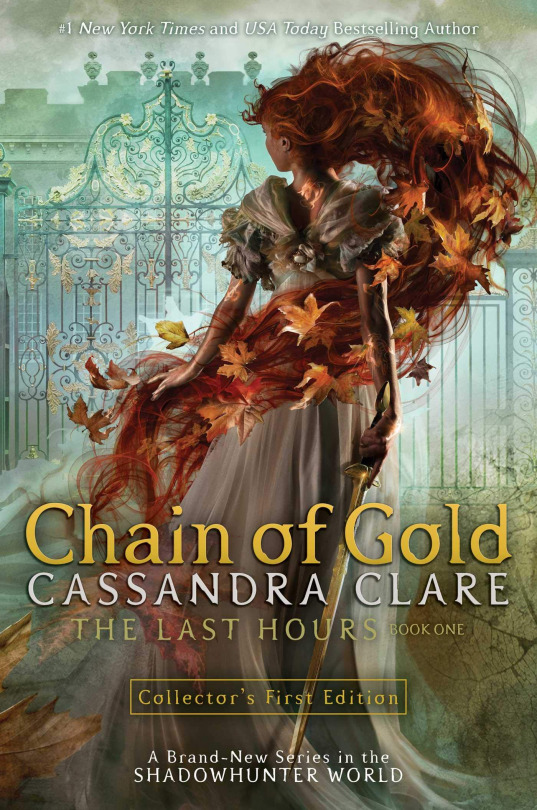
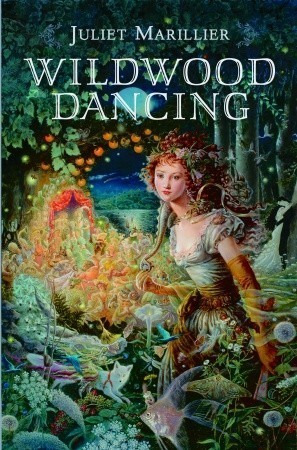
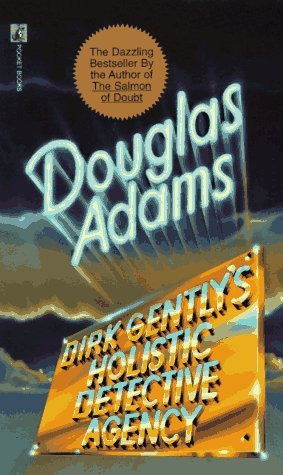
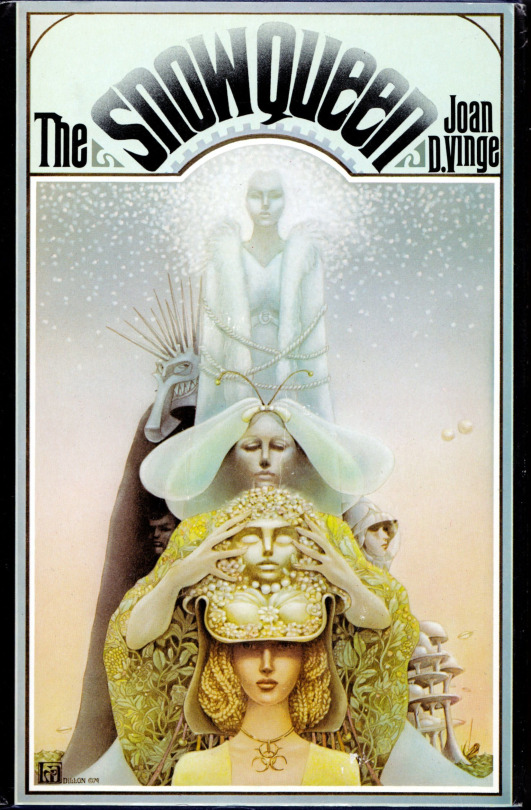


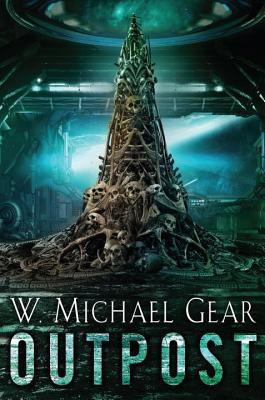

#TBR#April 2023#booklr#chain of gld#the last hours#Cassandra Clare#Juliet Marillier#Wildwood Dancing#dirk gently's holistic detective agency#douglas adams#The Snow Queen#Joan D. Vinge#Memory & Dream#Charles de Lint#The Tale of Genji#murasaki shikibu#Outpost#W. Michael Gear#The Whispering Dead#Darcy Coates
0 notes
Text
One of the best things about BSD is the way it’s educating anime fans about real Japanese literature. In modern times westerners (i say as if im not a westerner) tend to think of anime and manga when someone mentions Japanese culture. It’s about Pokémon and Hello Kitty and anime girls in skimpy outfits. And Asagiri is bridging the gap between all that and real, meaningful stories and poetry. Despite how much I post about different anime I don’t consider myself an anime fan, just someone who enjoys stories in all formats including anime. So for me it’s really great to see anime fans branching out because of anime. It’s also wonderful that he’s drawing attention back to real literature (not trying to be snobby I just mean thing that aren’t so commercialized, things written by writers because it meant something to them).
It’s also fantastic to learn more about classics from other cultures and languages because it’s not something I’m usually exposed to. I grew up immersed in books and literature but really only in English. We’ve got Th Big Book of Shakespeare (idk if it’s really called that it’s just whet we tend to call it, it’s a collection of all of his works in one book. It’s huge) and we’ve got limited editions of both The Hobbit and The Lord Of The Rings (the Little Green Book and The Big Red Book) and just about every science fiction book you can name for Carl Sagan’s Contact to the entire Dune series to The Snow Queen by Joan D. Vinge. We’ve got poetry, novels, short stories. It funny, one of our book shelves got so full it actually broke and we didn’t even bother fixing it because we’d already started just stacking books around it so it’s just a huge pile at the moment. Point is I grew up surrounded by books and I really appreciate them. I love literature with my whole heart. And what Asagiri is doing with BSD makes me so incredibly happy because it’s bringing real literature back into the spotlight while also being a masterpiece in its own right and remaining true to its genre.
#bsd#bungou stray dogs#analysis#kafka asagiri#genius writing#literature#anime#manga#anime and manga#my ramblings#me being a lit nerd on main again
15 notes
·
View notes
Text
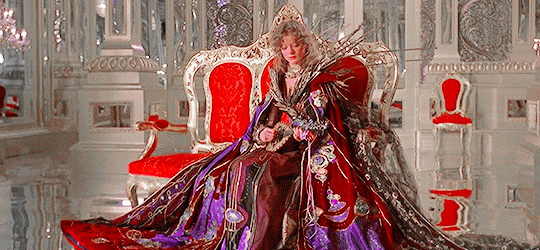
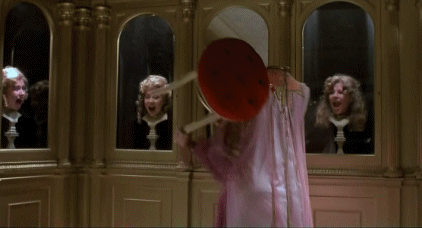
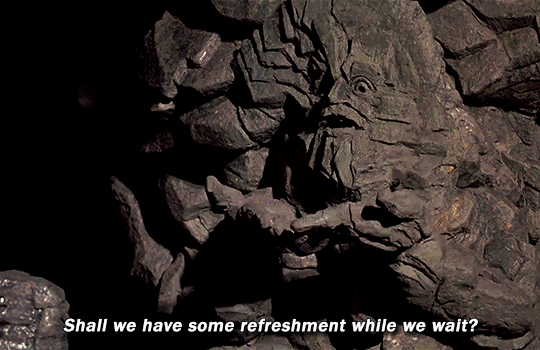
Return to Oz (1985, Walter Murch)
02/02/2024
Return to Oz is a 1985 film directed by Walter Murch, an unofficial sequel to the famous film The Wizard of Oz directed by Victor Fleming and produced by MGM in 1939. The film earned an Oscar nomination for best special effects.
Several months have passed since the events of The Wizard of Oz, and Dorothy Gale is melancholy because she continues to do nothing but dream of her magical adventure, and that Uncle Henry and Aunt Emma don't believe her.
Later, Dorothy discovers to her horror the Yellow Brick Path in ruins and, running along it with Billina, finds the Emerald City, Grey, desert, largely destroyed and with petrified inhabitants, including the Tin Man and the Cowardly Lion.
The film was produced by Walt Disney Pictures without the collaboration of MGM, or Warner Bros., the studio that currently holds the rights to the 1939 film.
The film's screenplay is based on L. Frank Baum's second and third novels, The Marvelous Land of Oz and Ozma of Oz, both sequels to The Wonderful Wizard of Oz.
George Lucas, Murch's friend and colle8, had to personally intervene, guaranteeing the studio that he would act as executive producer or even director in case of problems.
The soundtrack of the film was entrusted to the composer and musical writer David Shire, also know for numerous TV soundtracks, theater musical and for many films including Saturday Night Fever. The entire musical sequence from Dorothy's Theme to the Rag March of the final scene is accompanied by the London Symphony Orchestra.
The Italian dubbing of the film was directed by Renato Izzo, Gruppo Trenta.
On home video, in Italy, the film was released in VHS format by Walt Disney Home Video in 1986. The DVD was released in 2013 in the Disney Family Classics series.
Writer Joan D. Vinge adapted the film's screenplay into a novel.
#return to oz#film#walter murch#The Wizard of Oz#victor fleming#metro goldwyn mayer#Academy Award for Best Visual Effects#dorothy gale#uncle henry#aunt em#tin woodman#cowardly lion#walt disney pictures#l. frank baum#the marvelous land of oz#ozma of oz#the wonderful wizard of oz#george lucas#david shire#saturday night fever#london symphony orchestra#Renato Izzo#Pumais Due#Walt Disney Studios Home Entertainment#Disney Films Classics#Joan D. Vinge#dark fantasy#nicol williamson#jean marsh#piper laurie
31 notes
·
View notes
Text
The Snow Queen: o regresso ao lugar feliz

Regressar na idade adulta aos livros em cuja companhia fomos felizes na juventude é sempre um risco. Muitos anos e muitas leituras depois, ainda encontraremos o mesmo encanto naquelas personagens, nas suas vidas, nos seus mundos próprios? Certo: os grandes livros ficam sempre, mas os leitores, esses, vão mudando ao ritmo dos anos. Não tenho grandes dúvidas de que, se num destes dias der por mim a regressar a Os Maias, vou continuar a gostar reler Eça como gostei de o ler aos 17 (ainda que por motivos porventura distintos), mas pergunto-me se hoje encontraria tempo, fôlego e disposição para me voltar a aventurar em, por exemplo, Dostoiévski, como me aventurei há tantos anos na transição da escola secundária para a universidade. Talvez sim, talvez não; dir-me-ão que só há uma forma de descobrir. Mas com tão pouco tempo livre, tão espremido entre vários hobbies, e com tantos livros por ler, regressar àquelas leituras marcantes afigura-se quase como um desperdício. Não é, bem sei: reler um bom livro jamais será tempo deitado fora.
Com isto, note-se, não quero dizer que não releio. Longe disso, aliás: regresso amiúde a Tolkien, com The Lord of the Rings ou The Silmarillion, ou a Ursula K. Le Guin com The Left Hand of Darkness ou Earthsea (muito a propósito, conto regressar ao arquipélago de Le Guin no próximo ano, desta vez para o explorar de fio a pavio). Tolkien e Le Guin resistem ao tempo e ao espaço; dou por mim a encontrar nas suas páginas sempre alguma novidade. Mas se há regressos que continuam regulares, outros nem por isso. Há já largos anos, mais do que me lembro - pelo menos uma década - que não regressava a Joan D. Vinge, autora fundamental da minha vida enquanto leitor: afinal, foi com ela, e com o seu premiado The Snow Queen, que descobri a literatura de ficção científica, algo que me deu muitas amizades, me proporcionou óptimas experiências, e me fez - faz - gastar em livros talvez mais dinheiro do que devia.
(mas valeu - vale - a pena, ó se vale)
Isto para dizer que foi com algum receio que durante as minhas férias de Novembro fui à estante buscar o meu exemplar de The Snow Queen. Sem exagero, terei lido centenas de livros e de contos de ficção científica desde a última vez que tinha regressado àquelas páginas hoje amareladas; seria o livro ainda tão bom como as minhas memórias o lembravam? Ou encontraria nele um texto datado, muito àquem das minhas recordações e da importância enorme que teve na minha vida?
Este receio, vim a perceber por volta do segundo capítulo, revelou-se infundado.
É claro que, relendo hoje este livro de 1980, encontramos alguns elementos um pouco datados. Vinge escreve bem, com uma prosa clara e sugestiva, mas aqui e ali tende um pouco para o melodrama. Se fosse escrito hoje, talvez The Snow Queen estivesse mais próximo do território e das prateleiras do young adult, ainda que com alguns content warnings (violência sexual ligeira, violência animal bastante gráfica, ideário suicida); consigo imaginá-lo com facilidade por esse prisma. Mas o universo que Vinge constrói, no longo rescaldo da queda de um império galáctico e da consequente perda da maior parte da tecnologia avançada que o sustentava, continua a ser uma maravilha de worldbuilding. Vemos sobretudo o planeta Tiamat, claro, com uma breve passagem por Kharemough, mas intuímos o suficiente sobre os restantes mundos da Hegemonia (a organização que, em pequena escala, tenta recuperar um pouco do império galáctico) a partir das personagens que se vão cruzando com Moon, Sparks, ou Arienrhod, Jerusha ou Ghundalinu. As especificidades de Tiamat - órbita longa a originar estações longuíssimas e disparidades climatéricas tremedas - não são meramente superficiais; todos os detalhes têm impacto nas culturas humanas do planeta, nas migrações e nos ciclos de poder entre Summers e Winters, na proximidade ou na distância para com a Hegemonia e o acesso à sua tecnologia. A rede das sibilas, essa, com tudo o que lhe está subjacente, é uma invenção prodigiosa, sobretudo para o final dos anos 70. E muitos dos temas que Vinge aborda - alterações climáticas, destruição do ambiente e consequências dessa devastação, afirmação feminina em sociedades patriarcais, colonialismo e extractivismo por parte de elites corruptas - continuam tristemente actuais ao fim de quase 45 anos; um dado que reforça a minha convicção de que o esquecimento a que Vinge hoje se encontra votada (decerto também por estar impossibilitada de escrever há muitos anos) é bastante injusto. Dado o momento em que nos encontramos, aliás, praticamente todos os temas que explora no livro terão hoje uma urgência que talvez não tivessem em 1980. Nesse aspecto, The Snow Queen não envelheceu nem um pouco: continua jovem, como se consumisse a "água da vida" central à sua trama.
Sobre esta, sendo The Snow Queen uma adaptação, ainda que livre, do conto homónimo de Hans Christian Andersen, quem conhecer a história do dinamarquês decerto adivinhará algumas das reviravoltas e prever para onde se encaminham certos arcos narrativos. O que não quer dizer que não haja algumas surpresas - por exemplo, com algumas das amizades que Moon vai fazendo ao longo da sua odisseia, mas sobretudo com Arienrhod, a titular Rainha de Gelo, monarca de Inverno. Em Arienrhod encontramos uma vilã complicada, uma líder política numa sociedade aparentemente matriarcal (o que não significa isenta de preconceito, com se vê já um pouco aqui, e como se verá numa das sequelas) tolerada pelas estruturas coloniais e patriarcais pelo acesso que lhes dá a recursos naturais - no caso, a juventude eterna, ou pelo menos tão eterna quanto o Inverno de Tiamat. Sob a sua máscara fria e cruel, porém, encontramos uma líder com a experiência de décadas e décadas, com um projecto muito próprio para o seu planeta - e se é certo que nunca deixará de ser a antagonista da história, também é verdade que chegamos ao final a vê-la de forma um pouco diferente da Arienrhod que nos é apresentada logo no prólogo.
Noutras tramas paralelas à de Moon, Sparks e Arienrhod encontramos Jerusha, a competente inspectora da polícia hegemónica cujo percurso encaixaria na perfeição no actual discurso de "DEI" (Diversity, Equity, and Inclusion) para dizer algumas coisas pertinentes sobre o tema (e para reafimar que a diversidade, em si, importa), e o seu assistente, Ghundalinu, um jovem aristocrata deserdado dividido entre o seu estatuto e o seu carácter; se a sua descrição básica parece cliché, a sua evolução ao longo da história é assinalável. Outras narrativas mais pequenas, mas relevantes para os protagonistas e para dar algumas pistas sobre aquele universo, includem Fate Ravenglass, Tor (e Pollux), Miroe e Elsevier.
Já conhecia todas estas histórias e personagens, claro - li The Snow Queen pela primeira vez ainda no secundário, na edição portuguesa em dois livros de bolso da Europa-América, e depois já em Lisboa, no meu primeiro ano de universidade, quando comprei esta edição paperback com a belíssima capa de Michael Whelan; reli-a algumas vezes, até porque me acompanhou em todas as casas em que vivi em Lisboa ao longo dos últimos 20 anos (e foram bastantes), e até em algumas viagens. Mas foi com gosto que as reencontrei, e que regressei ao universo de Joan D. Vinge; e ao chegar ao último capítulo dei por mim com vontade de continuar - de enveredar pelas sequelas, World's End e The Summer Queen, e pela prequela Tangled Up in Blue, e de rever a continuação da história de Moon. É possível que algum leitor que não conheça o livro o encontre mais datado do que o encontrei, que encontre space operas mais modernas capazes de falar dos mesmos temas de forma mais subtil, mais adulta até (assim de repente, ocorre-me o excepcional The Vanished Birds, de Simon Jimenez, mas decerto haverá outros textos). Com todos os livros que li, e com todos os textos que escrevi sobre ficção científica, é bem provável que continue a ser incapaz de me distanciar deste livro que tanto me diz, e ao qual tenho associadas tantas memórias. Dito de outra forma: que continue a ver as personagens e o mundo de Joan D. Vinge como tal como vi há vinte anos. O que, parece-me, é bom sinal: não só porque me agrada preservar esse gosto, esse encantamento, nestes dias mais cinzentos, como também por ter a certeza de que posso regressar a Tiamat e a Kharemough com confiança: fui lá feliz em tempos, e continuarei a sê-lo.
4 notes
·
View notes
Text
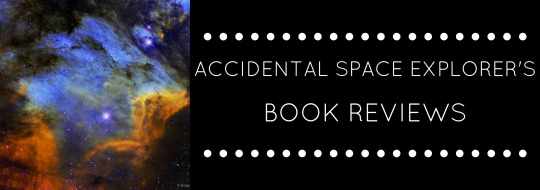
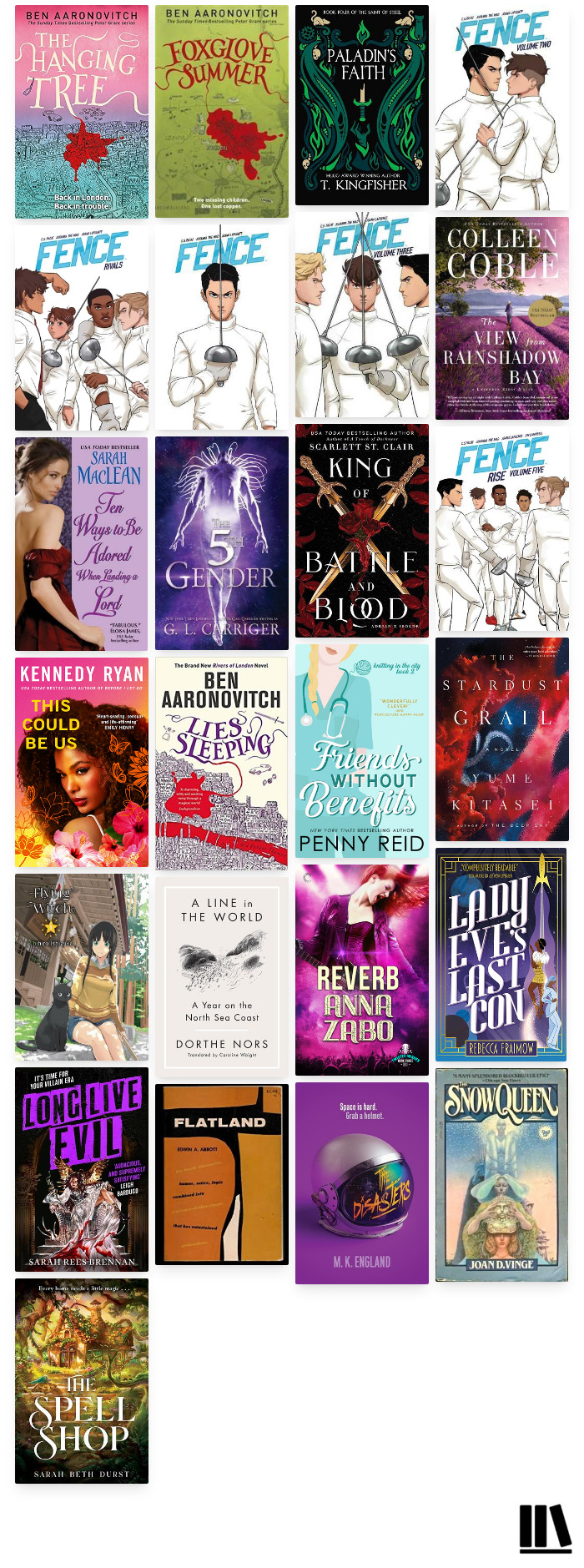
September Monthly Recap
I read so many books in September, entirely because of Magical Readathon - it's so fun and motivating! Total I ended up with 27 books read, 1 of which was a DNF. My favorite this month was 100% Long Live Evil, which I'm still vibrating about two weeks later.
Foxglove Summer by Ben Aaronovitch: 4.5/5
The Hanging Tree by Ben Aaronovitch: 4.5/5
Paladin's Faith by T. Kingfisher: 5/5
Fence, Vol. 1 by C.S. Pacat & others: 4/5
Fence, Vol. 2 by C.S. Pacat & others: 4/5
Fence, Vol. 3 by C.S. Pacat & others: 4/5
Fence, Vol. 4 by C.S. Pacat & others: 4/5
The View from Rainshadow Bay by Colleen Coble: 2.5/5
Ten Ways to be Adored When Landing a Lord by Sarah MacLean: 4/5
The 5th Gender by Gail Carriger: 2/5
The Element of Fire by Martha Wells: 4.5/5
King of Battle and Blood by Scarlett St. Clair: 4.25/5
Fence, Vol. 5 by C.S. Pacat & others: 4/5
This Could Be Us by Kennedy Ryan: 5/5
Lies Sleeping by Ben Aaronovitch: 4.75/5
Friends Without Benefits by Penny Reid: 2/5
The Stardust Grail by Yume Kitasei: 4.5/5
Flying Witch, Vol. 1 by Chihiro Itazuki: 3/5
A Line in the World by Dorthe Nors: 4/5
Reverb by Anna Zabo: 3.5/5
Lady Eve's Last Con by Rebecca Fraimow: 4.75/5
Long Live Evil by Sarah Rees Brennan: 5/5
Fence, Vol. 6 by C.S. Pacat & others: 4/5
Flatland by Edwin A. Abbott: 3.5/5
The Disasters by M.K. England: 3/5
The Snow Queen by Joan D. Vinge: 3.75/5
The Social Animal by David Brooks: 1.5/5, dnf very early on
The Spellshop by Sarah Beth Durst: 4/5
Goals under cut:
Complete series: -1 for the year (+1)
Catch up on backlists: 29 (+2)
Read FIYAH/Nebula/Hugo finalists & awards: 10 books (+1)
Read down TBR: at end of September it’s 1549 (+3 is not too bad!)
Read old top-of-TBR list: 5 (+1)
5 notes
·
View notes
Text
indie weird-fiction/SFF recommendation
hey remember how about a month ago i found ARCs of these three books in a "free" shed at my town dump
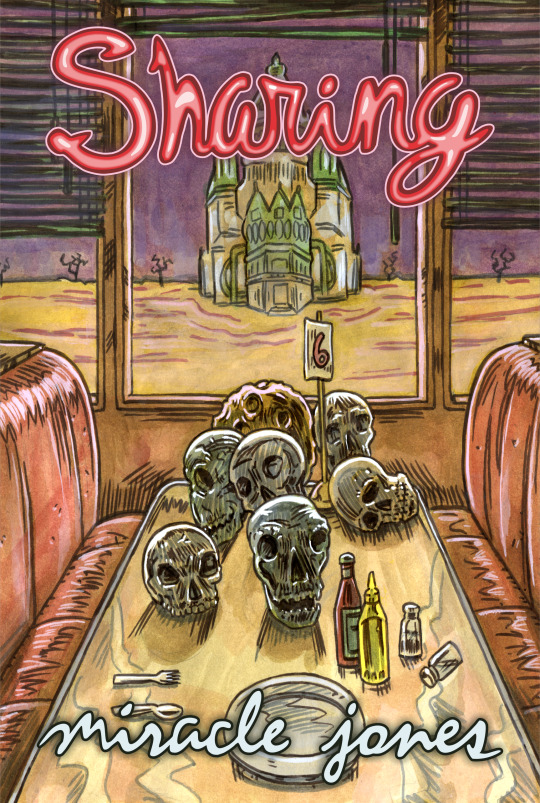
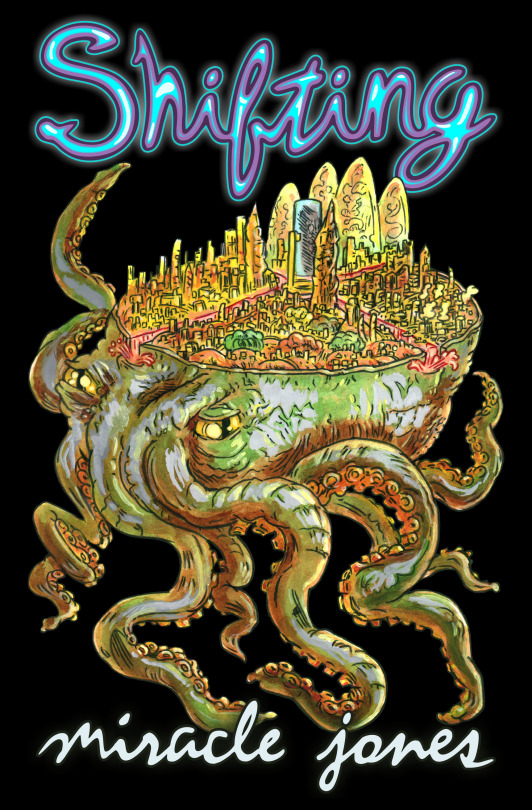
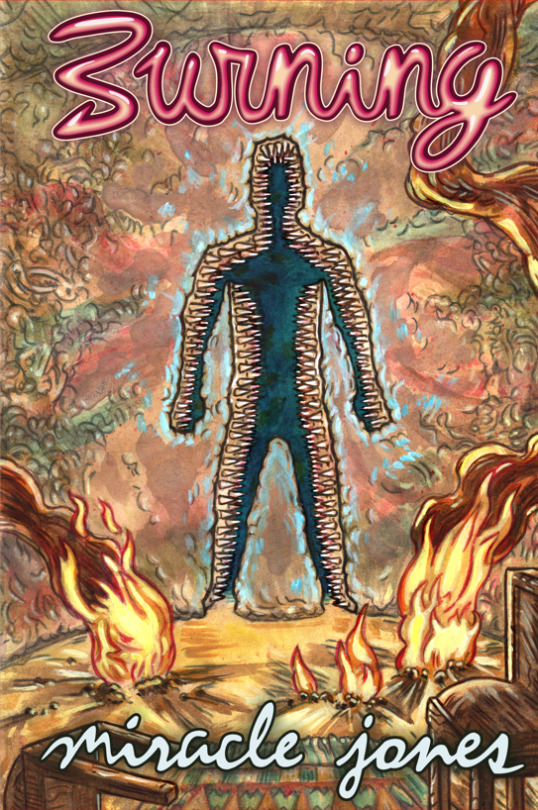
and i picked them up because the back copy really piqued my interest & i thought "okay they're free. let's try it. if the first one sucks i'll bring them all back"
well i am happy to report they extremely did not suck. in fact i absolutely adored them & am now very very invested in this ongoing story (planned as a series of 7, supposedly the 4th is coming out next year). i don't know how much the ARCs differ from the published books - which are available here from the publisher - & i will say that the ARCs were "rough" in the sense that there are typos, grammatical issues (mostly pronoun/tense problems) & very occasional missing or wrong words, but i didn't find it hampered my ability to read very much. i don't know if those are fixed or not in the final copies but i enjoyed the books so much that i don't particularly care - which is a pretty big thing for me, haha.
the blurb on the site & back copy compares them favorably to a mix of authors (William S. Burroughs, Tom Robbins, Kurt Vonnegut, David Mitchell) but those aren't really my points of reference & so not the comparisons i would make! i would heartily recommend them to fans of Clive Barker (especially if you prefer his fantasy work like Imajica & Abarat but you're still down for some seriously horrific violence/gore). pieces of Shifting also reminded me of reading Joan D. Vinge's Cat series which was very formative for me. there's a madcap element to these that definitely fits the Robbins comp but there's also real emotional depth to the characters/relationships - idk i haven't read that much Robbins but it didn't do it for me like these did.
the worldbuilding (focused on psionics, multiverses) & the characters are both incredibly unique & super memorable. i don't like to lean on lists of "representation" in book recs BUT on the other hand i don't generally connect with things that have absolutely no queerness in them, so. is there queerness here? yes! transness? debatably. is it "good rep"? totally beside the point. no. yes if you're like me & you prefer things to be messy & weird? whatever
these books are raunchy & explicit. they're hilarious. the first one horrified me & the last one made me tear up. this traumatized fantasy found family has wormed its way into my heart & i am going to be in love with a cockroach ("fairy") & a blood-sucking miniature machine planet (which is also sort of a cat?) for the rest of my life. other excellent characters include psychic plants & fungi, vicious paper people, sentient stuffed animals with semi-automatic weapons, a lesbian fire dragon & the scariest unicorns you've ever seen.
no one i know has ever heard of these books (though someone in my town owned them! who are you. where are you. why did you give them up). please, please some else read them & talk to me about them. give the first one a try - about halfway through it, i could not put it down.
3 notes
·
View notes
Note
Here's a 2 parter:
Favorite book?
Favorite TV show of all time?
Hey there, love!
Favorite book is easy. Snow Queen by Joan D. Vinge. The world building is just as rich as Dune (and ALSO a Hugo winner, though she didn't have to share) but much more human. Because, let's face it, Dune was kinda ... white dude?
Yes, yes, call me Miss Andry, but I'm not really sure noting that mid 20th century literature was limited in that it only considered 6% of the world population as a viable audience is all that controversial.
This book fundamentally changed how I look at men and my gratitude is boundless.
TV show? Trek, all the Trek. I was a little less enthusiastic until Disney/LucasFilm did their thing, but regardless, Trek has always held firm to the idea that humanity can be better.
And that's my jammy jam jam.
Thank you, dahlink!
5 notes
·
View notes